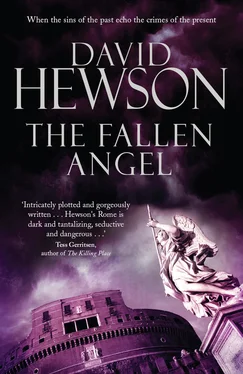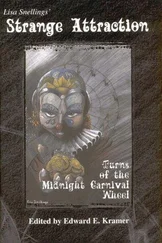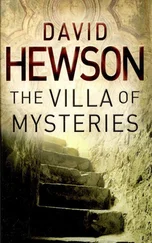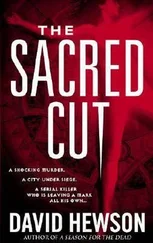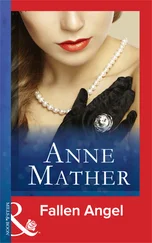David Hewson - The Fallen Angel
Здесь есть возможность читать онлайн «David Hewson - The Fallen Angel» весь текст электронной книги совершенно бесплатно (целиком полную версию без сокращений). В некоторых случаях можно слушать аудио, скачать через торрент в формате fb2 и присутствует краткое содержание. Жанр: Триллер, на английском языке. Описание произведения, (предисловие) а так же отзывы посетителей доступны на портале библиотеки ЛибКат.
- Название:The Fallen Angel
- Автор:
- Жанр:
- Год:неизвестен
- ISBN:нет данных
- Рейтинг книги:5 / 5. Голосов: 1
-
Избранное:Добавить в избранное
- Отзывы:
-
Ваша оценка:
- 100
- 1
- 2
- 3
- 4
- 5
The Fallen Angel: краткое содержание, описание и аннотация
Предлагаем к чтению аннотацию, описание, краткое содержание или предисловие (зависит от того, что написал сам автор книги «The Fallen Angel»). Если вы не нашли необходимую информацию о книге — напишите в комментариях, мы постараемся отыскать её.
The Fallen Angel — читать онлайн бесплатно полную книгу (весь текст) целиком
Ниже представлен текст книги, разбитый по страницам. Система сохранения места последней прочитанной страницы, позволяет с удобством читать онлайн бесплатно книгу «The Fallen Angel», без необходимости каждый раз заново искать на чём Вы остановились. Поставьте закладку, и сможете в любой момент перейти на страницу, на которой закончили чтение.
Интервал:
Закладка:
No one would mourn the man who, in Rome, had called himself Bernard Santacroce. His body still lay in the Questura morgue, awaiting instructions, and would probably remain there for months to come. Cecilia Gabriel had made it plain she would not be responsible for any burial. No other relatives existed. The British and American authorities had expressed an interest in the case immediately Santacroce’s true identity became known. Simon Gabriel, it seemed, was a man with an international reputation, wanted around the world for drug and people smuggling, money laundering, fraud, a litany of twenty-first-century sins. All of them pursued, for almost a decade, from behind the genteel walls of the Palazzetto Santacroce, a property he had bought back from a distant relative, apparently through legitimate means, and used as an opaque front for his activities.
The legal accountants were now poring over Santacroce’s empire and finding, for the most part, little but obfuscation and mystery. The palazzetto itself had been signed over to the Confraternita delle Civette, the charitable organization he had revived in order to lend his presence in Rome some plausibility. Control of that would now, ironically, fall to his sister-in-law, Cecilia Gabriel, the woman who had been charged over his death. She had been released on bail after a brief court appearance for manslaughter, a heroine it seemed to the Roman crowds, who had followed the story of this English family with the same voracious appetite that their predecessors, four centuries before, had shown towards the Cenci.
Some things never changed in this city, Costa thought to himself. Though there was, perhaps, a little more mercy now. Everyone knew that the Gabriel woman would never see the inside of a jail. She’d lost her husband, her son, and the honour and dignity of her daughter. The popular consensus was that she had done nothing wrong. That a crime committed in the defence of innocence was no real crime at all. Beatrice and her stepmother went to the scaffold; Mina and Cecilia Gabriel stepped onto the front pages of the newspapers and magazines, becoming a cause celebre in the worthy fight against domestic violence and abuse.
Costa had taken Falcone’s advice and gone back on holiday. The two men needed a little distance between them. Both had recognized this. Falcone himself had taken sudden leave and disappeared to Sardinia to stay with an old colleague from the Questura. This case had tested their closeness and left each a little wary of the future. The younger officer was growing, working towards the inevitable, the next promotion, a rank that would one day equal that of Falcone. He did not feel in any way in competition with a man he regarded as both mentor and one of his closest friends. Yet the Gabriel case had created difficulties that would not easily disappear. Falcone hated mistakes, in himself most of all. The hurt he felt for the way he pursued Mina and Cecilia Gabriel would, Costa judged, take some time to subside.
Investigations such as these always possessed some kind of aftermath, a lingering sense of doubt and failure. This one in particular.
He’d stayed at home as Falcone had suggested, calling Agata, who’d gone to the convention in Milan with her boss, with no success. Concerned, Costa had phoned her school repeatedly only to be told she wasn’t there. The messages he left on her phone went unanswered until two days before, when a single text promised that she was fine and would soon be back in Rome.
So he worked on the Vespa, painting out more rust, tidied the garden, and paid a neighbour to harvest the vines and take away the grapes to be made into the usual soft red table wine, the humblest of vintages, that his field produced.
And from time to time he visited the Questura, forensic in particular, asking questions. He was the only one to do so. The matter was closed, with gratitude mostly. The tantalizing, unanswered details shelved. Why spend money out of academic interest? Bernard Santacroce, Simon Gabriel, the monster at the heart of this tragedy, was dead.
The singing ceased in the church opposite. Someone came and threw open the shiny green wooden door into San Tommaso ai Cenci. Costa retreated back into the shadow beneath the wall of the vast, sprawling palace that overlooked this tiny piazza.
He barely recognized Mina when she came out. Her hair was cut short and dyed a chestnut colour. She wore large black sunglasses to hide her features, which was understandable since her face was now well known in Rome. With her black skirt, black jacket and white shirt she could have been twenty or more, no longer the child in pink pyjamas he’d seen curled into a close ball of agony on the lawn of the Palazzetto Santacroce a week before.
Without a word to any other mourner she set off on foot, back down the alley, towards the Via Beatrice Cenci and the river. The route to the tower of the Casina delle Civette, the place that, in spite of all its memories, still seemed to be home.
He followed her from a distance, across the busy Via Arenula where she waited for a tram from Trastevere to pass, then on into the dark nexus of lanes that led towards the Campo dei Fiori. When she went back into the palazzetto he found his courage failing.
In a tiny cafe near the footbridge across the river he drank a macchiato slowly, called Agata again and got no answer. Then he walked out to the road by the river, thinking of the point a little further along where Beatrice had died four centuries before by the pretty bridge of the Ponte Sant’Angelo, with its marble angels bearing the instruments of both ecstasy and torture.
The funeral cortege would have passed close by. He could almost imagine that he saw it crossing the Ponte Sisto with its ragged beggars hunched on the ground and their mongrels tethered with string.
Costa called Agata. When there was no answer he walked back into the darkness, knowing he needed to see Mina Gabriel again. One more time. One more.
TWO
The girl was alone in the living room in the upstairs apartment of the Casina delle Civette, curled up on the sofa with a book in her hands. Her adult black business suit had been replaced by fashionable tight slacks. Mina Gabriel wore a long-sleeved cotton shirt with a beaded necklace. This close he regretted the loss of her young, blonde hair, its replacement with a short, stylish cut, more sophisticated, more adult. The young, distressed girl he’d met that dark hot August night seemed to be gone for good.
It was just past midday. Bright, sunny, cloudless. The palms shimmered in the heat beyond the windows. The room hummed gently to the tune of the air conditioning.
He took the chair opposite her and asked, ‘Where’s your mother?’
‘Sorry? I was deep in the book.’
She showed him the title: The Fall of the House of Usher and Other Writings by Edgar Allan Poe.
‘ “ Mon c?ur est un luth suspendu: sitot qu’on le touche, il resonne ”,’ she recited, reading from the page in front of her.
‘I’m afraid my French isn’t so good,’ he said.
Mina screwed up her nose. For a moment she was childlike again.
‘I suppose you could translate it as, “My heart is a silent lute, touch it and it sounds.” Poe uses it as an epigraph, misquoted unfortunately. I think I prefer The Tell-Tale Heart , to be honest. Usher’s a bit. . I don’t know. A bit too creepy.’
Her words trailed off into silence.
‘You’ve done something?’ he said, indicating her hair.
‘You like it?’ She bobbed the side with her long fingers. ‘Photographers. I had to do this magazine shoot. What a pain! They said I couldn’t look like a schoolgirl. Not that I ever was one. Apparently it was some famous cutter. I don’t know. And these clothes. I don’t care much for them really. Appearances.’
Читать дальшеИнтервал:
Закладка:
Похожие книги на «The Fallen Angel»
Представляем Вашему вниманию похожие книги на «The Fallen Angel» списком для выбора. Мы отобрали схожую по названию и смыслу литературу в надежде предоставить читателям больше вариантов отыскать новые, интересные, ещё непрочитанные произведения.
Обсуждение, отзывы о книге «The Fallen Angel» и просто собственные мнения читателей. Оставьте ваши комментарии, напишите, что Вы думаете о произведении, его смысле или главных героях. Укажите что конкретно понравилось, а что нет, и почему Вы так считаете.
